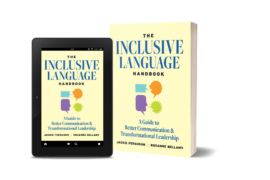Author’s Note: As DEI experts, The Diversity Movement often advises client organizations to recruit and hire interns from underrepresented groups and become mentors or sponsors to increase belonging (which leads to greater bottom-line results). We recognize the impact of internships, mentorship, and sponsorship, and are committed to modeling the best practices we recommend throughout our own organization. This article is just one example.
In the early Fall of 2021, I received my first email from the T-STEP program at the University of North Carolina’s School of Medicine in partnership with Wake Tech Community College. They were looking for volunteers to mentor unpaid interns for the duration of a school semester. As the Programming and Curriculum Manager at a small but fast-growing company, the thought of securing an eager, qualified intern for 3 months was a dream!
T-STEP stands for the TEACCH School Transition to Employment and Postsecondary Education, and was developed to support the transition to employment and post-secondary education for 16-21-year-olds with Autism Spectrum Disorder. The acronym TEACCH within their name stands for teaching, expanding, appreciating, collaborating, cooperating and being holistic – the core values of the program’s approach to autism treatment and support.
As a volunteer mentor, I would be assigned one student intern who would contribute to any project of my choice for twenty hours throughout the semester. In return, I would meet with the student for 15-30 minutes each week to review their work and discuss strategies related to time management, organization, asking for help, and more.
I really didn’t know what to expect when I signed up to be a mentor. As mentioned above, T-STEP students range in age from 16-21 and also identify on various points of the autism spectrum. Would my student be able to complete the task I was hoping they would? Would they show up on time to our meetings? Would they be a clear communicator?
The answer to all of the above questions was a resounding yes! My intern was polite, prompt, and needed very little to no help with the work assigned on a week-to-week basis. In exchange for just 15-30 minutes each week, the return on investment was strong.
The experience brought to life the lessons we teach in our online courses and the advice we give to our clients: people with neurodiversity bring highly sought-after skills to the table.
In fact, research shows time and again that neurodiversity is a significant business advantage. A report by JPMorgan Chase found in Financial Times (paywall) that professionals in its Autism at Work initiative made fewer errors and were 90-140% more productive than employees without neurodiversity.
Additionally, a study by the Institute for Corporate Productivity found that 86% of employers rated employees with intellectual and developmental disabilities as very good in four out of four areas critical to business success. Study after study shows that people with neurodiversity – whether it is Autism Spectrum Disorder, ADHD, dyslexia, or more – make exceptional employees. My T-STEP intern was no exception.
Throughout the semester, my intern remained focused and engaged with the same meticulous task our company direly needed to complete. That task was to review nearly 400 pieces of content (blogs, podcasts, webinars, guidebooks, etc.) and add keyword tags to each piece so that our content database would be more easily searchable by all employees within the organization.
It may seem like a small task, but the impact was significant. Rather than scrolling through hundreds of blogs, employees could now search for a specific word, such as “bias,” and see every piece of content that mentioned the topic. It increased internal efficiency and allowed us to better target content to our clients and audience. My intern needed just a bit of coaching here and there and was always receptive and quick to integrate feedback. The internship experience was truly a win-win.
This semester, we’ve welcomed two more T-STEP interns, both residing within the content-marketing team. These interns are currently working on data entry, content categorization, and copyediting, helping our team become more efficient and effective. Their contributions have been invaluable as they’ve integrated seamlessly into our organization.
We are proud supporters of T-STEP’s mission and hope we have given our interns at least half of what they have given us.
Kaela Sosa, CDE, is Curriculum and Programming Manager at The Diversity Movement as well as one of its founding members. With a degree in Psychology and Gender Studies, Kaela has fought for the visibility and acknowledgement of issues pertaining to underrepresented groups for nearly a decade. Connect with her on Linkedin.






